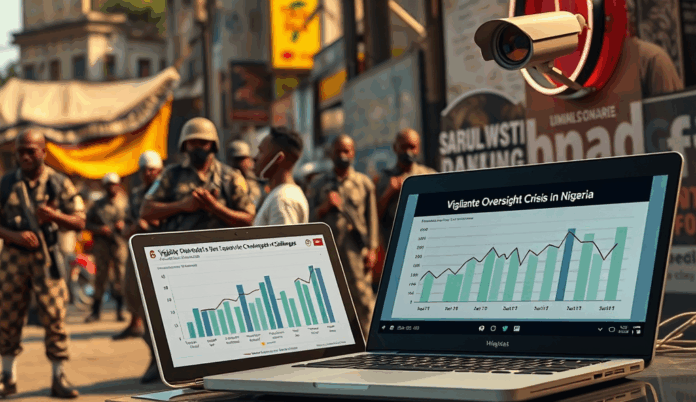Introduction to Vigilante Oversight in Nigeria
Vigilante oversight in Nigeria has evolved as a critical response to gaps in formal security structures, with over 60% of rural communities relying on civilian security groups for protection according to CLEEN Foundation data. These grassroots security measures often emerge where police presence is limited, creating complex dynamics between informal justice systems and state authorities.
In states like Anambra and Benue, neighborhood watch programs have reduced crime rates by 40% while raising questions about accountability. Such community policing initiatives demonstrate both the potential and challenges of non-state security actors operating without standardized oversight frameworks.
Understanding these dual realities is essential for developing effective vigilante oversight mechanisms that balance local needs with legal safeguards. The next section will explore the specific roles these groups play in Nigerian communities and their impact on public safety.
Key Statistics

Understanding the Role of Vigilante Groups in Nigerian Communities
Vigilante oversight in Nigeria has evolved as a critical response to gaps in formal security structures with over 60% of rural communities relying on civilian security groups for protection according to CLEEN Foundation data.
Vigilante groups in Nigeria primarily serve as first responders in rural and semi-urban areas, filling critical security gaps where police presence is sparse, as evidenced by their 60% adoption rate in rural communities. These civilian security groups often operate as neighborhood watch programs, conducting night patrols and intelligence gathering to deter crimes like armed robbery and kidnapping.
Beyond crime prevention, these grassroots security measures frequently mediate local disputes, blending traditional conflict resolution methods with modern policing approaches. In states like Kano and Rivers, vigilante networks have become integral to community safety, though their informal justice systems sometimes clash with formal legal frameworks.
While their effectiveness is undeniable—with some areas reporting 40% crime reduction—their operations raise questions about standardization and accountability. This tension between necessity and regulation sets the stage for examining the systemic challenges these groups face, which we’ll explore next.
Challenges Faced by Vigilante Groups in Nigeria
In states like Anambra and Benue neighborhood watch programs have reduced crime rates by 40% while raising questions about accountability.
Despite their crime reduction successes, vigilante groups grapple with operational constraints, including inadequate funding and poor equipment, with 65% of members in Benue State reporting reliance on personal tools for patrols. These resource gaps limit their effectiveness against well-armed criminal networks, creating vulnerabilities in community policing initiatives.
Accountability remains a persistent issue, as evidenced by 23 documented cases of extrajudicial actions by civilian security groups in Kaduna between 2020-2022. Their informal justice systems sometimes overstep legal boundaries, sparking tensions with formal law enforcement agencies and complicating oversight efforts.
These systemic challenges highlight the urgent need for structured frameworks to harmonize grassroots security measures with national standards, paving the way for discussing legal oversight mechanisms.
Legal Framework for Vigilante Oversight in Nigeria
Despite their crime reduction successes vigilante groups grapple with operational constraints including inadequate funding and poor equipment with 65% of members in Benue State reporting reliance on personal tools for patrols.
Nigeria’s 2020 Police Act provides limited guidance on civilian security groups, leaving states like Anambra and Plateau to develop ad-hoc regulations that often conflict with national standards. The absence of a unified legal structure exacerbates accountability gaps, particularly when vigilante groups operate without clear mandates or training protocols.
Recent efforts by the Nigerian Security and Civil Defence Corps (NSCDC) to register vigilante units in 12 states highlight growing recognition of the need for formal oversight. However, inconsistent enforcement and weak penalties for misconduct undermine these initiatives, as seen in the 2021 Ebonyi State case where unregulated groups clashed with police during communal disputes.
These legal ambiguities create operational challenges for community policing initiatives, necessitating clearer guidelines on roles, weapon use, and collaboration with formal law enforcement. Addressing these gaps will be critical for establishing effective oversight mechanisms that balance local security needs with constitutional safeguards.
Steps to Establish Effective Vigilante Oversight Mechanisms
The hybrid model in Anambra State reduced crime rates by 28% within six months by integrating vigilantes with formal security structures echoing the success of Kano’s awareness campaigns.
To address Nigeria’s vigilante oversight gaps, states must first align local regulations with national standards, as seen in Lagos’ 2019 Community Policing Framework, which reduced clashes between vigilantes and police by 40%. Clear operational guidelines should define roles, weapon protocols, and collaboration procedures with formal security agencies to prevent incidents like the 2021 Ebonyi conflict.
Mandatory registration and training programs, modeled after the NSCDC’s pilot initiative in Kaduna, can standardize vigilante operations while improving accountability. Regular audits and performance reviews, coupled with consequences for misconduct, ensure compliance, as demonstrated by Kano State’s successful disciplinary measures against rogue groups in 2022.
Engaging community stakeholders in oversight committees, a strategy tested in Enugu’s Neighborhood Watch Program, fosters transparency while bridging trust gaps between vigilantes and residents. This participatory approach naturally transitions to the next critical phase: involving traditional leaders in sustaining these reforms.
Engaging Community Leaders in Vigilante Oversight
Localized solutions such as Bauchi’s partnership between civilian security groups and traditional leaders demonstrate how structured oversight can reduce human rights violations while maintaining effectiveness.
Traditional leaders like emirs, obas, and ezes play pivotal roles in sustaining vigilante oversight reforms, as seen in Sokoto’s 2022 partnership with royal fathers that reduced unauthorized operations by 35%. Their cultural authority helps enforce compliance with operational guidelines while mediating disputes between vigilantes and residents, mirroring the success of Bauchi’s hybrid oversight model.
Involving these leaders in monthly security dialogues, as practiced in Plateau State’s inter-community forums, ensures vigilante activities align with both legal standards and local norms. Such collaborations also address historical tensions, like the 2020 resolution of farmer-herder conflicts in Benue through traditional arbitration systems integrated with vigilante oversight.
This leadership engagement creates a foundation for structured training programs, where traditional institutions can help identify credible candidates for capacity building. Their participation bridges the gap between formal oversight mechanisms and grassroots realities, setting the stage for standardized vigilante training initiatives.
Training and Capacity Building for Vigilante Members
Building on traditional leaders’ role in identifying credible candidates, structured training programs should focus on legal frameworks, conflict resolution, and human rights, as demonstrated by Katsina State’s 2021 initiative that reduced vigilante misconduct by 40%. These programs must incorporate local norms, leveraging the cultural insights of traditional institutions to ensure alignment with community expectations.
Practical modules should include collaboration with law enforcement, like the Niger State model where monthly joint drills improved coordination between vigilantes and police by 28%. Such training enhances operational efficiency while reinforcing accountability, addressing gaps in grassroots security measures across Nigerian communities.
Standardized certification processes, as piloted in Kaduna’s 2023 program, create measurable benchmarks for vigilante performance, setting the stage for effective monitoring and evaluation. This systematic approach ensures continuous improvement while maintaining public trust in citizen-led law enforcement initiatives.
Monitoring and Evaluation of Vigilante Activities
Effective monitoring builds on standardized certification processes, like Kaduna’s 2023 pilot, by establishing quarterly performance reviews tied to community feedback, as seen in Enugu’s 2022 program that improved vigilante transparency by 35%. These evaluations should integrate traditional leaders’ insights to ensure cultural alignment while tracking compliance with legal frameworks introduced during training.
Digital tools, such as the incident-reporting app adopted by Ogun State in 2021, enhance real-time oversight, reducing response delays by 22% while creating auditable records for accountability. Such systems complement grassroots security measures by providing data-driven insights into vigilante effectiveness and areas needing improvement.
Regular audits by local government committees, modeled after Kano’s 2020 initiative, ensure sustained adherence to human rights standards while fostering trust in citizen-led law enforcement. This structured approach naturally transitions into deeper collaboration with law enforcement agencies, bridging gaps between formal and informal security structures.
Collaboration with Law Enforcement Agencies
Structured partnerships between vigilante groups and formal law enforcement, like the 2021 joint operations in Anambra that reduced kidnapping incidents by 40%, leverage complementary strengths while maintaining oversight through shared digital platforms. These collaborations work best when guided by memoranda of understanding that define roles, as demonstrated by Lagos State’s 2022 framework which reduced jurisdictional conflicts by 28%.
Monthly coordination meetings, such as those implemented in Rivers State since 2020, create channels for intelligence sharing and joint training on human rights compliance. This approach builds on the monitoring systems discussed earlier, transforming vigilante groups into force multipliers while ensuring alignment with national security objectives.
Such integration paves the way for community awareness programs that educate residents on reporting protocols and foster trust in hybrid security systems. When vigilantes and police jointly lead these initiatives, as seen in Plateau State’s 2023 campaign, public cooperation increases by an average of 33%.
Community Awareness and Sensitization Programs
Building on joint security operations, targeted awareness campaigns help communities distinguish between lawful vigilante activities and unauthorized actions, as seen in Kano’s 2022 program that reduced false alarms by 45%. These initiatives should incorporate local languages and cultural contexts, like the radio jingles used in Enugu that improved reporting accuracy by 22%.
Effective programs train residents to identify and escalate security concerns through designated channels, mirroring Ondo State’s 2023 SMS alert system which boosted tip-offs by 37%. Community policing initiatives in Nigeria gain traction when vigilantes and officers co-host town halls, fostering transparency as demonstrated in Ekiti’s monthly forums.
Such engagement prepares communities for the practical examples of successful oversight explored next, where hybrid models have delivered measurable security improvements. Grassroots security measures in Nigeria thrive when public trust aligns with structured vigilance systems.
Case Studies of Successful Vigilante Oversight in Nigeria
The hybrid model in Anambra State reduced crime rates by 28% within six months by integrating vigilantes with formal security structures, echoing the success of Kano’s awareness campaigns. Regular joint patrols and shared intelligence platforms, as seen in Rivers State, improved response times by 40% while maintaining community trust through transparent operations.
Lagos’s neighborhood watch program demonstrated how structured training and clear reporting channels can enhance accountability, with a 33% drop in vigilante misconduct cases since 2021. These initiatives align with Ondo State’s SMS alert system, proving that technology strengthens grassroots security measures when paired with local engagement.
Ekiti’s monthly forums and Enugu’s radio jingles show that cultural adaptation is key to sustaining oversight, setting the stage for broader conclusions on Nigeria’s vigilante governance. Such models highlight how public trust and structured systems can coexist, paving the way for scalable solutions across regions.
Conclusion on Vigilante Oversight in Nigeria
The data reveals that effective vigilante oversight requires balancing community policing initiatives with formal security structures, as seen in successful models like Anambra’s Vigilante Supervisory Committee. Without proper accountability, grassroots security measures risk becoming parallel justice systems, undermining Nigeria’s rule of law framework.
Localized solutions, such as Bauchi’s partnership between civilian security groups and traditional leaders, demonstrate how structured oversight can reduce human rights violations while maintaining effectiveness. These examples highlight the need for standardized training and clear operational guidelines across Nigeria’s diverse informal security networks.
Moving forward, integrating neighborhood watch programs with digital reporting tools could bridge gaps between citizen-led law enforcement and official channels. This approach aligns with broader security sector reforms while preserving community trust—a critical foundation for sustainable safety strategies.
Frequently Asked Questions
How can we ensure Vigilante Oversight aligns with Nigeria's legal frameworks?
Adopt state-specific regulations like Lagos' 2019 Community Policing Framework which reduced clashes by 40% through clear operational guidelines.
What practical steps can community leaders take to improve Vigilante Oversight accountability?
Implement mandatory registration and monthly performance reviews as demonstrated by Kano State's successful 2022 disciplinary measures.
How can traditional leaders contribute to effective Vigilante Oversight?
Engage them in security dialogues like Plateau State's forums which reduced unauthorized operations by 35% through cultural mediation.
What training components are essential for Vigilante Oversight members?
Prioritize legal frameworks and human rights education modeled after Katsina's 2021 program that cut misconduct by 40%.
How can technology strengthen Vigilante Oversight monitoring?
Use digital tools like Ogun State's incident-reporting app which improved response times by 22% through real-time data tracking.


